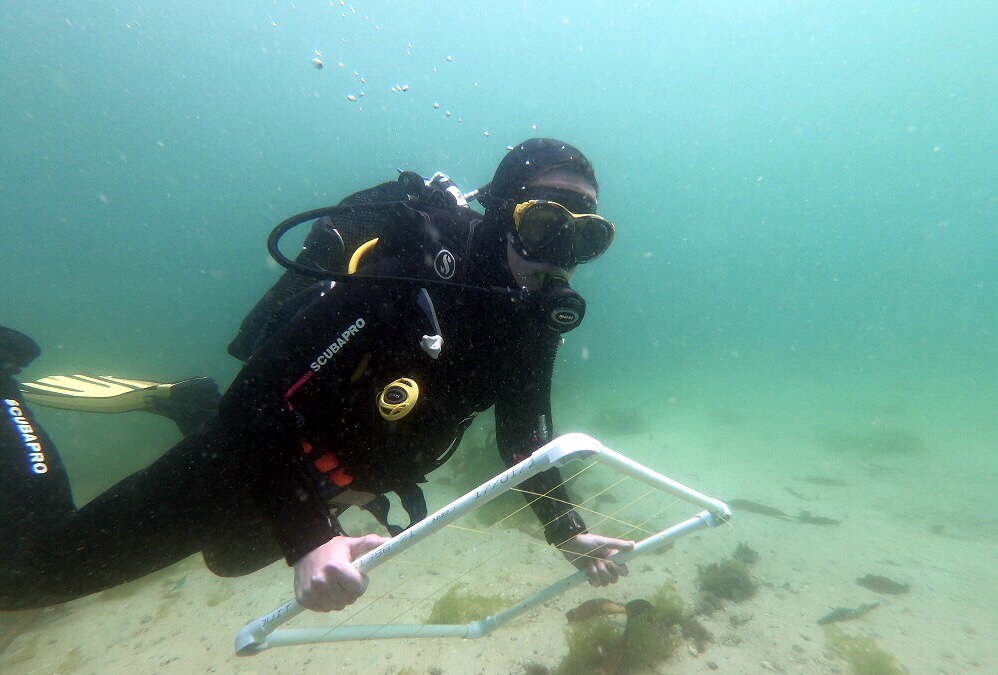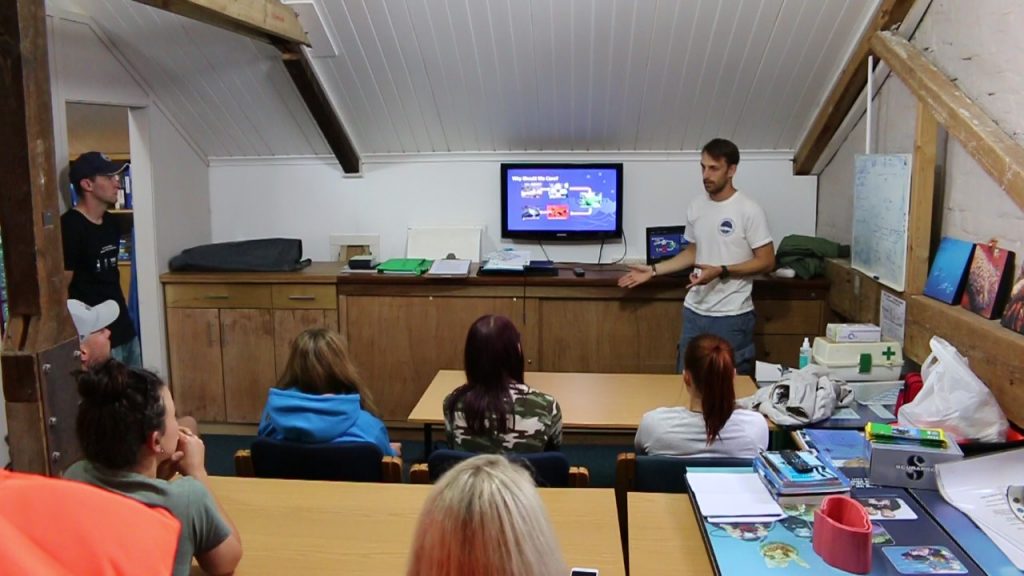When people think of marine biology, they often think of swimming with dolphins. But there is a whole lot more to study out there, from microscopic algae and kelp forests to white sharks and blue whales… IF you have the right skill set. Not all marine biologists are divers and there are many ways in which marine biologists can study and collect data below the surface without getting wet, such as using baited remote underwater videos (BRUVS) or remote operated vehicles and drones (ROV). However, from time to time most scientists have to venture into the field to collect data, and to really get an idea of an environment and understand the species and complexities of an ecosystem, sometimes the best thing scientists can do is kit up and dive in!

As the founder and course director of Cape RADD, a marine biology research facility based in Cape Town, my job is to write and collate relevant material and field skills for the SCUBA marine field course and make sure the information and skills we are teaching are of high quality and value to our students and importantly to their future employers and research careers. Scientific diving sampling techniques are invaluable to any scientist looking to work in the field of shallow water ecosystems.
90% of life in our ocean’s lives within the ‘euphotic zone’ or light zone, this is generally within the top 100ft of water or much less in murky water where the light can’t penetrate as deep. The majority of which falls within the recommended recreational diving limits, allowing in-situ exploration and investigation using various sampling methods using SCUBA and freediving techniques.
What is Scientific diving?
Although we usually associate scientific diving with marine biologists, it is used in a range of disciplines such as geology, archaeology, underwater engineering and ocean journalism.
Definition – ‘Scientific diving is the use of underwater diving techniques by scientists to perform work underwater in the direct pursuit of scientific knowledge’. Basically, if you are diving for data collection purposes then it is scientific diving, this is a very valuable skill as a biologist.

As a scientific diver there are some standard sampling techniques that you will need to understand and be able to execute if you want to work as a field biologist. For example, using quadrats and transects to measure percentage cover and density of species in specific habitats. These techniques are internationally recognized and published methods of data collection used in many ecological studies. These are also some of the sampling techniques taught at Cape RADD making sure our students have a head start in these techniques.
Although it sounds relatively straight forward it is surprisingly challenging when there is strong surge, current or low visibility, and field biologists must be able to work in all conditions, not only the calm clean topical waters. Scientific diving takes a lot of concentration, team work and a good level of fitness to be able to execute the objectives of the dive.
However, the most important skill you need to be an effective scientific diver is to be completely comfortable in the water, and for this you must have excellent buoyancy. This is something I really try to drive into our students during the first week of dive training, without good buoyancy control the quality and quantity of data collection is jeopardised, not to mention the amount of damage and disruption caused to the environment we are trying to sample and observe. This takes practice and experience, but the more diving you do the more comfortable you will get. I see huge improvement and development in our students throughout the 4-week period.

Being a field biologist isn’t just about SCUBA diving and collecting data, it involves a lot of data input and analysis, writing papers, communicating science to the public and designing and maintaining field equipment. These are some of the skills we offer in the form of workshops and presentations in topics such as fish biology, R statistics and GIS, making sure Cape RADD students get a well-rounded experience of field biology and leave with a solid foundation of knowledge.
Why are these skills and experience so valuable?
When you come out of University and begin searching for your next goal, whether this is further study as a post graduate or scientific work, having some field experience and knowledge of how data is collected and analysed in the field gives you a huge advantage because it sets you apart from those who haven’t developed these skills alongside the relevant degree.
Scientific dive operations are carried out by a wide range of organisations including Universities, government agencies, consultancy companies, and NGOs, to name a few, opening up a whole new sector of employment opportunity and exciting research to be involved in.
Summary

Although not every marine biologist will work as a scientific diver, having these skills and experiencing the challenges, advantages and limitations of in-situ data collection first hand is invaluable for life as a marine biologist designing and implementing research projects.
If you are a marine or environmental scientist (or want to become one) and have a passion for the underwater world and conservation, exploring kelp forests, coral reefs, and observing fish and shark diversity and behaviour, then scientific diving is a great skill to have!
For more info on the Cape RADD marine field course aimed at training early career scientists looking to further their experience and knowledge as a marine field biologist get in touch! info@caperadd.com
1 Comment
5 reasons you should join a field course internship ? - Cape RADD · May 6, 2019 at 3:24 pm
[…] You will not only learn and develop these vital field skills, you will learn what your good at, what you’re not so good at and how you react under different conditions and in different environments. During a marine science field course, you will find yourself under pressure, in wild and unusual situations and having to make decisions in the field. The idea of a field course is to give you as much responsibility and room to grow as possible, under good instruction so YOU understand the challenges and get satisfaction and grow your confidence as a field biologist. […]